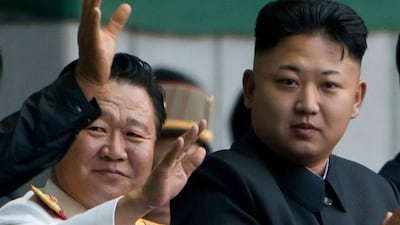North Korea has replaced its long-serving nominal head of state with a close aide to leader Kim Jong-un who was placed on a US sanctions list last year for alleged human rights abuses.
Kim Yong Nam, who held the position for almost 20 years, was replaced by Choe Ryong Hae, who will take over the role of representing Pyongyang at international engagements, KCNA said.
The reshuffle, formalised during a session of Pyongyang's rubber-stamp parliament, the Supreme People's Assembly (SPA), comes at a time of heightened diplomatic activity that has seen Kim Jong-un hold landmark summits with the leaders of the US, China and South Korea.
As SPA president, Mr Choe is technically head of state, although real power in North Korea is wielded by Mr Kim and his immediate family.
Analysts say his appointment suggests a generational shift in the North's leadership, especially after the collapse of the Hanoi summit with Mr Trump in February.
Born in 1950, Mr Choe is considered Mr Kim's right-hand man – frequently referred to as the regime's "virtual number two official".
In the 1980s, he led the North's youth delegations on goodwill visits to a number of countries, including Russia, Libya and China, before being promoted to the party's powerful Central Military Commission in 2017.
Some reports have even suggested that one of Mr Choe's sons is married to Mr Kim's powerful sister, Kim Yo-kong.
He is also one of the three North Korean officials sanctioned by the US last year over human rights abuse allegations.
Mr Choe directs the North's "departments that perpetrate the regime's brutal state-sponsored censorship activities, human rights violations and abuses", US Treasury Secretary Steven Mnuchin said in December.
Analysts said the existing sanctions against Mr Choe will have little impact on his future diplomatic endeavours, as long as North Korea's nuclear dialogue with the US continues.
"Kim Yong Chol, the North's top nuclear negotiator, also has been sanctioned by Washington since 2010," said Ahn Chan-il, the president of the World Institute for North Korea Studies in Seoul.
"But he visited Washington without a problem earlier this year. Washington will always make exceptions – as long as Pyongyang has something to offer."
On top of being elected as the nominal head of state, Mr Choe was also appointed as first vice chairman of State Affairs Commission (SAC), the North's highest decision-making body – a position that was newly created after the North recently revised its constitution.
Cheong Seong-chang, an analyst at the Sejong Institute in Seoul, said this will allow Mr Choe to work with the North's key diplomats.
These include Foreign Minister Ri Yong Ho, Vice Foreign Minister Choe Son Hui and Pyongyang's top nuclear negotiator Kim Yong Chol, who were all also promoted to SAC members this week.
"Kim Yong Nam, while serving as the former nominal head of state, never got to have any roles in the SAC," Mr Cheong said.
"But Choe's position as the vice chairman of SAC – on top of the ceremonial head of state – gives him much more authority as he gets to lead a group of elite officials in charge of Pyongyang's diplomacy.
"The fact that these key diplomats became members of SAC signals Pyongyang's willingness for further diplomatic engagement with other countries."
Externally, however, Pyongyang has been stressing the importance of "self reliance" after talks on denuclearisation with Washington broke down in Vietnam in February.
Sanctions relief was top of Mr Kim's agenda for the Hanoi summit, but the meeting broke up without a statement as North Korea and the US disagreed over walking back Pyongyang's nuclear programme in exchange for relaxing trade restrictions.
Mr Kim earlier this week insisted Pyongyang would overcome the effect of sanctions by developing the socialist economy, telling party officials to push ahead with "self-reliance", KCNA said.
Pyongyang is "trying to undermine sanctions without agreeing to the current denuclearisation demand from Washington, while also improving its diplomatic strategies," Mr Ahn said.
"I believe the North is coming up with very dramatic economic reforms to survive the sanctions. Kim Jong-un needed someone younger and even more ruthless."
As expected, KCNA also reported that Mr Kim has been re-elected as chairman of the North's State Affairs Commission.
He was given a new title, described by the state-run newspaper Rodong Shinmun as "supreme representative of all the Korean people".

